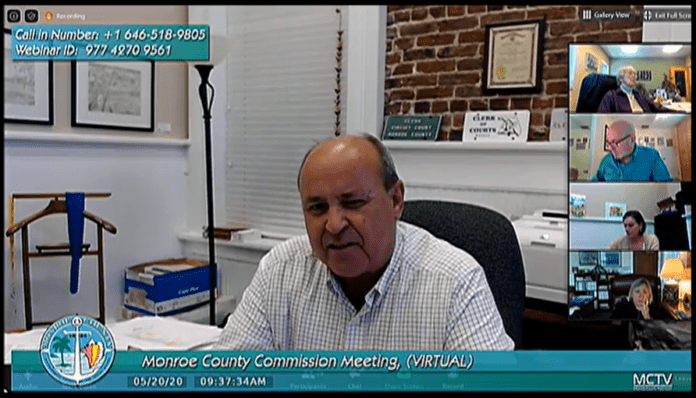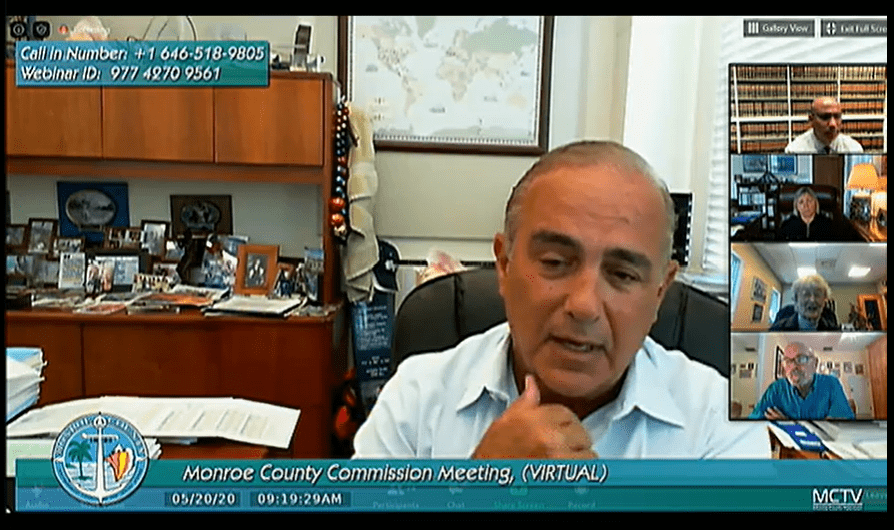
Monroe County Clerk of Court and Comptroller Kevin Madok came back in front of the Board of County Commissioners virtually to explain a very expensive ask at a time the county is reeling from lost tourism income. After extensive back-and-forth, the BOCC ‘reluctantly’ approved his $5 million request in a 4-1 vote.
The system “is essential to the operations of the Clerk’s comptroller functions as well as the BOCC’s OMB and HR functions,” the meeting agenda said.
Madok said, “ERP means Enterprise Resource Planning ‒ all of the back-office functionality that a county and the clerk run to make sure county operations run as efficiently as possible.”
The clerk said the ERP covers “a variety of areas” from budgeting, accounts receivable, cash receipts, grants management, project management, etc. and manages all money the county brings in that needs to be properly accounted for to ensure the county can fulfill purchasing and contractual obligations effectively.
The current system, Finance Plus, is sunsetting because its software vendor will cease to support or maintain the program on Dec. 31, 2021, the agenda said. Systems typically need replacing every 15 to 20 years, Madok said. Migrating to a new system takes a year to a year and a half, which puts the commission against a tight timeline to begin the switch.
Madok noted that Finance Plus, implemented in 2004, is heavily paper-based, lacks adequate management reporting abilities and requires repetitive data entry to maintain other administrative systems used by the BOCC and the Clerk.
Madok presented ERP software Workday as the suggested replacement and requested the ability to begin implementation at the May 20 BOCC meeting.
Madok said that $1.5 million in the clerk’s 2020 excess fees would be used for phase 1 of implementation and that the bulk $3.5 million would appear in his 2021 budget, which will come before the board this summer.
Commissioners and some staff expressed concern at a fixed implementation price when the end package had yet to be decided. Others noted that their departments may opt not to use new Workday modules or could remain paper-based, if needed, to save money. Mayor Heather Carruthers, particularly, wanted to ensure this was a “necessary expense” during the health and financial crisis.
County Administrator Roman Gastesi said, “The clerk recognizes it’s probably the worst time to ask for a big-ticket item,” before presenting a list of potential capital projects to be deferred to come up with money. Some of those include: Big Pine Key swimming hole, Rowell’s bathroom, tiny homes, Key West senior nutrition and Higgs Beach Road.

Carruthers, frustrated, said, “So the seniors in Key West won’t get nutrition? How many years ago did we promise them this? And we’re gonna defer it again?” The mayor asked whether there were aspects of the system that could be deferred or moved back to avoid sacrificing current projects.
Madok reminded the BOCC that Finance Plus was already on “life support” and that “they’re pulling the plug next year.”
Commissioner Sylvia Murphy noted, “Ok, then, can we wait until next year? We’re getting ready on June 1 to open the county and it could be a disaster. We may need that money for other things.”
Madock said that the long implementation process meant the county was nearing it’s “go or no-go” deadline.
He said, “The ERP is a central nervous system of the county, so we need some sort of solution. The timeline for it is a year, year and a half. It’s unfortunate, but no one intended to put us in this situation.”
Madock added that without a new system, the county could not function efficiently. He said, “(Non-implementation) would take us backward. I’m trying to avoid a very bad future situation.”
The impasse finally broke when Commissioner David Rice noted that the clerk’s office cannot complete its functions and financial reporting without a software backup, that implementation takes 15 months and that allowing the software to expire without replacement was not a way forward.
“Frankly, we’re between a rock and a hard place,” he said. “I don’t like where we are, but I don’t see a different way. We can’t expect the clerk to go out of business when this expires. I don’t want to spend the money either, but the alternative doesn’t appear to be very responsible either.”
Commissioner Michelle Coldiron requested that Rice’s motion to approve include direction to search for modules to cut to save money, which Rice included.
In a 4-1 vote, all commissioners other than Murphy voted “reluctantly” to approve Madok’s request with the caveat to explore what can be delayed to save money.
Commissioner Rice concluded, “We’re all reluctant, but it’s a one-way street.”
The 55-week project, if completed on time, is scheduled to go live July 1, 2021.




















